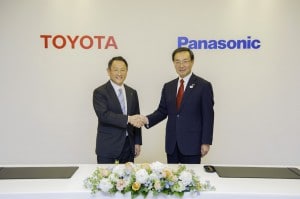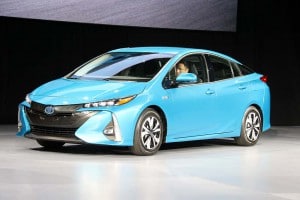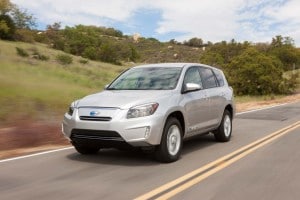
Aiming to catch up to competitors like Volkswagen, General Motors and Tesla in the fast-emerging battery-car market Toyota Motor Corp. plans to launch at least 10 electric vehicles by the early 2020s.
Along with the pure battery-electric vehicles, or BEVs, Toyota said Monday that it will offer some of battery-based powertrain technology for every product it offers through both the Toyota and Lexus brands by 2025, with sales of those models – as well as hydrogen fuel-cell vehicles – set to reach 5.5 million annually by 2030.

“Electrified vehicles, which are effective for economical consumption of fuel and promoting usage of alternative fuels, are indispensable in helping to solve current environmental issues,” Toyota said in a statement Monday morning. “As a result, the number of models developed without an electrified version will be zero.”
The move could help polish up the Japanese giant’s image as a leader in green powertrain technologies. Toyota was one of the first automakers to produce a hybrid model, and its Prius remains the segment’s global best-seller. It’s also a pioneer in hydrogen power. But the company has been slow to embrace more advanced battery technologies, including plug-in hybrids and BEVs. Monday’s announcement, following news of a new partnership between Toyota and battery maker Panasonic, could change all that.
But the competition is growing fierce. Nissan, which sells the world’s most popular BEV, the Leaf, has said there will be 12 BEVs offered through its global alliance, which also includes Renault and Mitsubishi, by 2022. Honda has laid out plans for two-thirds of its sales to be made up by various battery-based models by 2030.

(Click Here for a review of the Gen-2 2018 Nissan Leaf.)
General Motors recently launched the first affordable, long-range electric, the Bolt EV, and plans two more within 18 months, with 20 due by 2023. Ford has also promised to ramp up its electrified line-up, with its first Bolt competitor due in 2020.
In Europe, Volkswagen is planning 50 all-electric models for its dozen passenger car brands by 2025, including high-line Audi, Bentley and even Lamborghini. Daimler AG already offers 10 plug-in hybrid models and is expanding its line-up of pure electric models that will be sold through the new Mercedes-EQ sub-brand. Its Smart division is set to go almost entirely electric. BMW and Jaguar-Land Rover also plan major increases in plug-based models.
And then there are the new players, such as Tesla, Faraday Future and others focused exclusively on plug-in or BEV models.
Toyota could get a jump on its competitors, however, by switching away from the current state-of-the-art battery technology, lithium-ion, to an even more advanced chemistry known as solid-state. It has strongly hinted it will use that technology in the first long-range model it plans to debut in 2021 – and which will be produced at a new plant it is setting up in the U.S. in a partnership with Mazda.
(Toyota, Mazda, Denso create alliance to develop electric vehicle technology. Click Here for more.)
Toyota hasn’t had a BEV on the market since 2014, when it pulled the plug on the RAV4-EV it developed in cooperation with Tesla. Toyota long was skeptical of lithium-ion batteries because they were slow to charge, expensive and offered limited range. The maker also experienced some reliability issues with an early version of that chemistry.

While lithium batteries are rapidly plunging in price, while also becoming quicker to charge and more energy-dense, experts believe solid state batteries will be even more appealing. Some analysts believe they could be capable of a complete recharge in as little as five minutes, in line with what it takes to refuel a conventional, gas-powered vehicle.
Last week, Toyota announced it will form a partnership with Panasonic, one of the global leaders in automotive battery production. While details were not announced, the alliance is expected to emphasize the new battery technology.
At a news conference called to announce the partnership, Akio Toyoda, the grandson of Toyota’s founder, said, “The auto industry is now facing a major change of the kind that comes once in a hundred years.”
(Akio Toyoda sees electrified vehicles generating half of Toyota’s sales by 2030. Click Here for the story.)
At Monday’s briefing, Executive Vice President Shigeki Terashi said, “As a mass-market automaker we need to expand our offering of electric cars.”
There are several reasons why Toyota appears to be reversing its aversion to electric vehicles. New battery technology is one factor, but the carmaker also has to face the reality that it could get shut out of some key markets if it doesn’t shift to zero-emission vehicle, or ZEV, technologies. Norway and India have already laid out plans to ban internal combustion-powered vehicles over the coming decade, and Britain, France and Germany may follow suit. China recently set in motion its own, strict new rules setting minimum ZEV numbers. It may also follow with a complete ban, regulators have suggested.
(Toyota set to say more about its electrification strategy at 2018 Detroit Auto Show. For the story, Click Here.)







